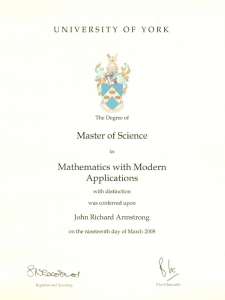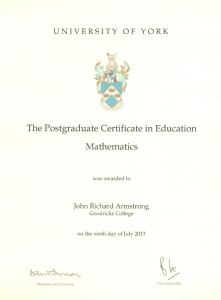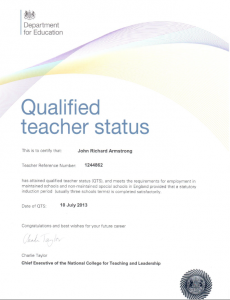A Level Maths Tutor (and Further Maths)
A Word From John Armstrong (Site Creator)
Hi! I'm John Armstrong, a specialist A Level Maths Tutor and A Level Further Maths Tutor with over 15 years of experience in one-to-one A Level Maths and Further Maths tutoring and classroom teaching.
Since 2009 I have successfully helped thousands of students and tutees - both in UK classrooms and online from across the world - excel in their A Level Maths exams and achieve outstanding A Level Maths results.
Please scroll down to learn more about my approach to helping you succeed in your A Level Maths and Further Maths.John Armstrong BSc.(Hons) MSc. PGCE
A Level Maths Tuition Prices
You will notice that my advertised rates for maths tuition are higher than those of many other tutors. This reflects my years of experience both as an A Level Maths tutor and classroom teacher, my dedication to all of my students and, most importantly, the outstanding grades that my students achieve as a result of our mutual hard work. Please expand the “About My Prices” menu below for more information.
- A Level Maths Tuition £GBP 125/hour
Tuition for all of the main UK A-Level Maths syllabuses (Edexcel, OCR A, OCR B MEI and AQA) and the iAL (International A Level) Maths, including Pearson Edexcel and Cambridge International.
- A Level Further Maths Tuition £GBP 125/hour
Tuition for all of the main UK A-Level Further Maths syllabuses and the iAL (International A-Level) Further Maths.
- Mathematical University Entrance Exams Coaching £GBP 125/hour
Tuition for university entrance exams such as STEP, TMUA and MAT.
More About Me And My Maths Tuition

Choosing an A Level Maths tutor who is right for you can have a massively positive impact on your learning and achievement. That is why I have provided below as much information as possible to help you decide and be sure that you are making the right move by choosing me as your A Level Maths tutor. Click on the expanding tabs below to find out more.
A Bit About Myself…
My name is John Armstrong and I am a UK-based fully qualified and experienced tutor and classroom teacher of A Level Mathematics and Further Mathematics. I also tutor university entrance exams such as STEP, TMUA and MAT.
As you can probably see from the sheer amount of A Level Maths and Further Maths resources on my site, I am passionate about students and tutees having access to the best resources to help give the best chance of exam success. Take a look, just for example, at the A Level Maths exam questions by topic that I have collated, my A Level Maths revision notes or the equivalent for A Level Further Maths; or the resource to date that I am most proud of: The Ultimate Study Tool for A Level Maths. I am absolutely dedicated to delivering the best for my own (and all other) students and tutees.
I have been professionally tutoring on a one-to-one and small group basis for many years now, refining and perfecting my tutoring approach over my many years. My classroom teaching experience is mainly in Sixth Form Colleges teaching A Level Maths and Further Maths and preparing students for maths and science entrance exams.
My Tutoring Approach and Philosophy
When it comes to studying A Level Maths and Further Maths, high grades come with hard work and practice. In my 15+ years of teaching experience, it is always the students that put the most work in that get the best grades.
As an A Level Maths tutor, it is my job to help you thoroughly understand the material, giving you the knowledge, self-confidence and – of course – the resources required to practice what you learn in the tutorial sessions and, ultimately, get the grades. I will help you to uncover which areas need work and will guide you through exactly what approach is needed to get the best grades in your A Level Maths exams. Naturally, I will need to modify my tutoring approach depending on your needs and the situation you are in, so if you would like more information and examples of how I would do this, please expand the tab below for some examples.
The Roles of an A Level Maths Tutor
A tutor can perform many roles. As an A Level Maths tutor, I have to be able to adapt to whatever your individual needs and circumstances might be. From my years of experience, I firmly believe that a good A Level Maths tutor must be able to perform any of the following roles depending on the needs of the student at the time:
A subject expert: over the course of my career, I have heard many stories from my students who had previously taken on tutors who were very good and accomplished mathematicians (university lecturers or PhD students, for example) but who didn’t have an in-depth knowledge of the A Level syllabuses which they tutored. Knowing the syllabuses inside-out – their idiosyncrasies, how the marking guidance has developed over the years, the differences between syllabuses – is key and fundamental knowledge for an A Level Maths and Further Maths tutor to be effective. An effective maths tutor should be adding value by giving students sound, expert guidance on how to improve both subject knowledge and technique ultimately leading to a boost in exam performance. A tutoring session should not simply consist of the tutor and student muddling through questions together session hoping that an improvement will be seen.
A teacher: a tutor may have all the above attributes but, to be effective, an A Level Maths tutor must also be skilled in being able to impart this knowledge upon their students. An effective A Level Maths and Further Maths tutor should have experience in both teaching and delivery in order to be able to engage and deliver content in a way that you understand. A well-practised classroom teacher of A Level Maths and Further Maths will be able to recall at a moment’s notice all of the content required and be able to instantly help students with any problems they may be facing.
A mentor: it is important that you choose an A Level maths tutor who can help motivate and drive you to success; a tutor who can get to know not just your mathematical strengths and weaknesses, but actually get to know you as a person and truly understand what makes you tick. Such a tutor will be better at helping you do what needs to be done to achieve your full potential in A Level Maths.
As an A Level Maths tutor and an experienced classroom teacher of A Level Maths, I have seen many different reasons why a parent would want a A Level Maths tutor. However, choosing a tutor with the right approach is always a worry and it can seem like a daunting task. I will now outline some common scenarios, one or more of which will probably ring true. Each individual student needs a personalised approach as each personality is different, however, in order to give you an idea roughly of the approach that should be taken by a tutor in a range of circumstances, let me give a few case studies of the different types of students and how a tutor may help.
Example Student #1: Underconfident and Scared To Ask For Help In Class
Laura (a hypothetical student) lets things get on top of her; she feels she understands most things to an extent in class but when it comes to things she doesn’t understand, she rarely asks the teacher. The thought of asking about something she doesn’t understand while everyone is watching sends shivers down her spine. And there are many more students like Laura; it is extremely common for A Level Maths students feel like this. They shouldn’t; we as teachers are here to help. However, the fact remains that some students don’t like to ask questions in class. And as a result they end up slowly falling behind.
My Approach as a Tutor
In my experience, these traits very common. So common, in fact, that I have written an article on how an A Level maths tutor can help students who have fallen behind. In this situation, the key to getting a student back on track is to thoroughly assess at the earliest opportunity. But the word” assess” can induce a lot of anxiety. The first thought that comes to mind is the idea of having to do a paper in timed conditions, a situation that would leave a student who is struggling feeling useless and exposed. But it need not be that way; assessment can be gentler. Assessment can be performed concurrently with teaching.
Over the years, I have found that assessment for the purpose of determining gaps in knowledge is better done during lessons using past paper questions; the approach involves concurrently discovering gaps in knowledge and supporting the student in filling those gaps. I have found this to be far more effective in the initial stages than simply setting a student off with a past paper and constantly reminding them their knowledge has gaps. The latter would be demoralising and serve no real purpose.
Once these initial gaps in knowledge are filled, I have found it particularly productive to then try to teach students slightly ahead of their class teaching schedule, getting them, say, one week ahead of what they will be learning in class so that they have the ground knowledge and confidence to ask (and answer!) questions in class.
Example Student #2: Overconfident After GCSEs and Doesn’t Practise
Simon (again, hypothetical) is a student who performed brilliantly in his GCSEs. An all round top grade student. However, a couple of terms into A Level Maths his grades from school seem to be slipping. Simon says that it is just a blip and that he feels he is doing well, but as a parent you are not so sure. This is yet another common scenario. Many students who have a natural ability up to about the GCSE level often find that as soon as a bit of extra work is required outside of lessons, things start to fall apart.
My Approach as a Tutor
This is yet another very common scenario, with these traits most commonly being found in boys who achieved highly at GCSE. Early intervention is the key to restoring confidence and instilling a strong work ethic that will carry them successfully through A Level. With this type of student it is imperative that the gaps in knowledge are diagnosed and that a programme of work is drawn up early on to help the student. But generating a (potentially long) list of knowledge gaps is not enough.
On its own, to simply tell a student that they are behind and can be overwhelming and demotivating. The best approach is to drip feed the students the gaps in knowledge and simultaneously plug the gaps so as not to knock the student’s confidence.
Once the gaps are filled and the student is back on track, a slightly different approach is then needed. As an experienced A Level Maths tutor, at this point I would ensure that the student actually starts to get ahead of the game, teaching them the content that they are about to study in class to give them a head start will put them in a position in which they ooze confidence, but by this stage the confidence is justified.
Example Student #3: High Achiever but Terrified of Exams and Underperforms in Tests
This particular type of student is also very common. The pressure of exam situations always gets to them and they underperform as a result. They are a top student: they ask questions; they do the homework; they take detailed notes and spend time rewriting them out neatly; they make beautiful concise revision cards to bolster their study. But it is with these final two points where the problem lies. The student spends a lot of time doing many many things other than the thing they find most difficult: exam questions.
My Approach as a Tutor
In my time as a classroom teacher and tutor of A Level Maths and Further Maths, I find that a gentle approach to try to wean students off spending their time producing (admittedly beautiful) archives of lesson notes and fantastic revision cards. With A Level Maths and Further Maths, any classroom teacher or private tutor will tell you that to do well, the key is practice practice practice of exam questions. To change the working habits of a hardworking and diligent high achiever could be made into a battle, but it is important not to approach it this way. I have found that the confidence of such high achieving students is easily shattered and to tell them that they have been doing everything wrong up to this point would be a mistake.
My approach in this situation would be to have the student to discover for themselves that there is a better way of working by gently nudging them in the right direction.
Example Student #4: Failed to Progress onto the Second Year of the A Level Maths Course
Dan struggled throughout his first year and never really seemed to get to grips with the jump between GCSE and A Level. A few weeks before the end of year tests Dan realised the mess he was in and worked harder than he’d ever worked before. But it was too late and it was not enough. He has been told that he didn’t get enough marks on his end of year test to progress to the second year, so if he wants to continue with maths he has no option but to repeat the year.
My Approach as a Tutor
With students in this scenario it is important that a tutor gets in there straight away before the student loses hope. Clearly the student’s confidence is bruised, but a good A Level Maths tutor will know that this situation can be turned round and made into a positive. In this situation, as a tutor I would capitalise on the improved work ethic that Dan exhibited towards the exam period and help him use this to his advantage. Dan has spent all of the last year feeling like he is bottom of the class but he will still have taken in a lot of the mathematics that was taught to him even if it is not currently fluent or instantly recallable, but there will be an underlying base knowledge. And provided a tutor works with Dan to keep him slightly ahead of the schedule of what he is going to be taught in class, he can go from like he felt last year (bottom of the class and behind) to feeling on top of the material and able to hold his own, achieving well in homework and class tests.
Conclusion
In order to be an effective tutor of A Level Maths and Further Maths, some degree of flexibility is required in order to adapt to the individual needs of a student. Not on that, but you need to bear in mind that the needs of the student can evolve over time. As a tutor, I am well aware that I need to keep my finger on the pulse and not just focus on the mathematics, but also look for the emerging signs and changes within student body language and demeanour to indicate whether a given approach needs to be modified. Being able to spot these signs early on comes only with experience.
I am passionate about helping all students (not just my own tutees) succeed in their A Level Maths and Further Maths studies. For this reason I have created hundreds of tutorial videos covering the entirety of the A Level Maths syllabus which are freely accessible on my YouTube channel. So even if you decide not to go with me as your tutor, you can still benefit from my teaching for free.
You can visit my YouTube Channel by clicking here.
My Academic and Professional Background
I am a fully qualified teacher of mathematics holding a PGCE and Qualified Teacher Status in the UK. My degree is in Mathematics and Computer Science and I hold a Master’s degree in Applied Mathematics in which I was awarded a “distinction” grade.
My classroom teaching background is in sixth form colleges where it was my full-time job to teach A Level Maths and Further Maths. You can view my certificates below.
In order for the sessions to be truly interactive, the student needs to have access to the technology that will make this possible. Many students have such technology without even realising it!
- A good, stable internet connection is essential to ensure that the session runs smoothly. Uninterrupted dialogue is essential to ensure that learning takes place.
- A tablet (e.g. iPad, MS Surface or Touchscreen Laptop) with stylus or a graphics tablet attached to your computer is used in conjunction with cutting-edge and simple-to-use whiteboard software which enables me to see what you are writing in real-time, allowing me to demonstrate, explain and mark your work as you produce it.
You may by this point still have reservations about the effectiveness of online tuition so to ease these anxieties and give you a full picture of how online tuition works, I have written an article on this very topic entitled “Online vs In-Person A Level Maths Tuition”.
And that’s everything! As long as you have access to both of the above then online tuition is as interactive, personal and effective as in-person tuition, as you can see from the video below.
You will have noticed that my tuition rates are higher than those of many other tutors. These rates reflect my many years of experience in teaching A Level Maths and Further Maths both in the classroom and through online tutoring, my qualifications and, more importantly, the results my students achieve through a partnership of both mine and their hard work and dedication. Each lesson includes:
- An hour of one-to-one tuition from me, John Armstrong, the creator of ALevelMathsRevision.com, an experienced teacher of A Level Maths and Further Maths with exam board marking experience;
- Expert advice on exam technique and how to “target the marks” in an exam situation on a topic-by-topic basis;
- Tailor-made resources to complete as homework that complement the learning process and further embed any newly learned material.
If you want to book a lesson or are unsure about whether one-to-one tuition is for you, please get in touch using the contact form below to organise an interactive online demonstration of how interactive, engaging and effective one-to-one tuition can be.
Yet More Information About A Level Maths Tutoring!
By this point you have probably gathered that I am passionate about helping young people achieve their goals. As a tutor, I also want to make sure that parents and students are provided with the right information so they ban make and informed decision about whether a tutor is right for them (whether or not they decide to choose me).
Below I provide a great deal of information and go into fine detail about things such as what to expect from my tuition, the equipment needed for my A Level Maths tutoring and how I adapt my teaching and tutoring style to cater for the various tuition needs that different student may have. Even if you decide not to go with me as your A Level Maths tutor, you will find lots of information that will inform you and guide you when searching for a suitable A Level Maths (or Further Maths) tutor.
- What To Look For in a Good A Level Maths and Further Maths Tutor
- Online Maths Tuition vs In-Person Maths Tuition
- The Biggest Mistakes People Make When Choosing an A Level Maths Tutor
- Finding An A Level Maths Tutor Who Matches Your Needs
- How An A Level Maths Tutor Can Help A Student Who Has Fallen Behind
If you feel that you have any further questions after reading these, then please do not hesitate to send me an email or submit and enquiry using the form below.
Book a Tutoring Session
For an initial chat or to arrange a taster session to see whether online 1:1 tuition is for you, for the quickest response please fill out the following form, giving all relevant details. I will respond via your preferred contact method as soon as possible.
Alternatively, email me at john@ALevelMathsRevision.com or call me on +44 (0)203 4 888 040.
Testimonials
Here are some of the things that my students and their parents have said about my tuition.
5.0
-
jared anderson ★★★★★ 7 months ago
My daughter took on Further Maths a bit later at the start of her first year in college as she swapped … More out another subject for it. As a result she really struggled initially but after just a few months of weekly sessions she gained an A at AS level. She, and we, were absolutely delighted and the improvement in her understanding and confidence was evident after just the first one or two sessions with John. Would highly recommend, thank you so much! Julie & Niamh Anderson -
Sadie Norris ★★★★★ 8 months ago
John has been an incredible tutor and mentor for my son, sitting both ‘Maths and Further Maths’ A levels. … More John was able to very quickly identify areas that needed more work, whilst also guiding my son to become independent in his own problem solving with tougher areas of the curriculum. John’s communication is excellent; both reassuring and inspiring. My son’s confidence has soared and he’s gone on to get excellent results. We couldn’t have been happier and we wholly recommend John. -
Rashida Ashby ★★★★★ 8 months ago
John has been absolutely and consistently supportive in prepping my year 13 son to university level. … More He has been accepted to read Mathematics with Finance and Economics at his first-choice university, City, university of London.Not only did John explain complex mathematics in a simplistic way he was also extremely patient, understanding (especially with boys) and most importantly regularly communicated to me my son’s progress so I was not left in the dark.First class – fantastic commitment and sincere dedication, John performed not just a job – Unlike previous tutors, John set weekly homework tasks; made sure it was completed on time and provided regular feedback to my son outside of the tuition period! John also coached my son to become more disciplined in his learning. Examples, effective self-study/ independent learning, writing out each step in his answers and not leaving the completion of tasks/revision to the last minute!!!When my son started A’level Further Maths tuition with John in November 2022 his predicted university grades in Further Maths and Maths were E & D respectively. By Spring 2023 end of term his predicted university grades jumped to B in Further Maths and A in Maths which gave him access to a wider range of good quality Universities to apply to read Maths.John’s support didn’t just stop at the start of the A’level exams he continued supporting us (yes me as well) until the end of the exams and supplied my son with Economics and Maths prepping resources for his University journey.With no hesitation, I highly recommend John, he is worth every penny spent and much, much more.All the best John in the future it has been a pleasure knowing you and once again thank you for all your wise words and parent support.P.S. If you plan to provide university level math’s tuition please give me a shout. -
Kevin Deegan ★★★★★ 8 months ago
John has endlessly supported me with my maths studies throughout Year 13. He has especially helped me … More a lot with MAT practice and taught me how manage my time efficiently in order to answer as many questions as possible during the exam. He also revised my personal statement and prepared me well for my university studies. It is only because of John that I was able to achieve A*s in both Further Maths and Maths for my A-Levels, allowing me to read Maths and Statistics at KCL. I will always be indebted to him for all his support and would reccomend him to anyone looking for a Maths Tutor! -
Alex Norris ★★★★★ 8 months ago
Tutored me in AQA F-Maths, was an excellent teacher and a pleasure to work with -
Anuva D ★★★★★ 8 months ago
John has taught my son Maths for over a year now and I can say after todays results that every penny … More spent on the classes was very well spent. Not only did my son grow in confidence as far as Maths and Further Maths course was concerned, he also evolved into a strong mathematician, that gave him the confidence to study Mathematics in University Level. He scored A*s in both Maths as well as Furthur Maths. John also gave us invaluable advice as far as university selection and checking the Personal statement was concerned. He is passionate about teaching Maths and a committed teacher. He would rearrange classes if my son missed a class, this is very difficult for him as he has to rearrange his entire timetable. He has so many resources my son found them very useful. My son now goes on to read Mathematics in Kings and we have only John to thank. More than highly recommended if you need a teacher, that can help you to achieve that A*. -
Charlie Phillips ★★★★★ 8 months ago
John is an absolutely fantastic tutor. In the space of around 9 months John took me from a grade D in … More 2022 to an A in 2023. Always punctual and aware of timings, and happy to answer any questions at anytime of day. My lessons were always enjoyable and John was always pleasant whilst pushing me to work things out on my own instead of simply showing me the answer. All in all, I enjoyed John’s Tutoring very much and would certainly recommend him to other students looking to improve in their maths. -
Padma Rangan ★★★★★ 8 months ago
I initially started sixth form getting B’s and C’s in Maths, until I started my lessons with John, and … More he helped me to see Maths in a different point of view, and helped me practice Maths in a way that I found it much more enjoyable. He really understands each students’ needs and I found that any gaps in my knowledge were quickly tackled and my confidence in Maths greatly increased. He explains it in a way that is easy to understand and accessible for any student, and with the use of the Miro board is able to easily see how better I could approach any question. With his help, I was able to achieve an A* in Maths, and was able to secure a place at medical school. -
Alana Ferrer Sangwan ★★★★★ 8 months ago
There’s not enough stars to rate John!! When I contacted John, my daughter was nearing the end of her … More first year of A levels. She was failing Maths and was completely and utterly lost at school. And all we wanted was for her to pass! The results were declared a couple of days ago- she got an A !!John is an excellent tutor all round and I cannot recommend him enough. From explaining concepts to giving her shortcuts to save time to the resources he provides on his website, my daughter’s confidence just grew and grew. It was an amazing transformation to witness!John is an extremely dedicated tutor who cares about his students and helps them to achieve their goal. He understands his students, is quick to spot what they need help with ( including if thats exam nerves ) and he was always available to clear up her doubts.John is worth every penny we spent and more. Ive had other tutors that I have paid more for but got a lot less in return.Thank you John! We were so lucky to have found you! -
Deborah Phillips ★★★★★ 9 months ago
John is fantastic. He has tutored my son through a resit year and the improvement has been incredible … More both in his mathematic ability and his confidence. John is very calm, understanding and his lessons are well structured and organized with clear work set in between. John’s online resources are really comprehensive and my son attended the Easter residential revision course which was a valuable opportunity to consolidate his knowledge prior to the exams. I would not hesitate to recommend John as a tutor.





